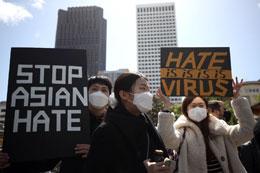Poll shows young hardest hit by racism

Generational change is needed to combat the ugly by-product of COVID-19, the intensification of anti-Asian discrimination in Canadian communities, states a new poll.
As a nation eagerly looks to the weeks and months ahead to regain a closer semblance to their pre-pandemic lives, Canadians are far more pessimistic about the timelines associated with eliminating of anti-Asian discrimination said the Angus Reid Institute in a comprehensive new public opinion survey
The survey from the Angus Reid Institute, in partnership with the University of British Columbia, finds Canadians of Asian descent aged 18 to 34 most likely to have experienced and been affected by anti-Asian racism and bigotry over the last year.
This, as nearly half (47%) of Asian Canadians identify discrimination aimed at them to be a problem in their own communities.
The study – which canvassed the opinions of Canadians of non-Asian and Asian ethnicity, found that a majority (58%) of the latter group has experienced at least one of a range of situations related to anti-Asian discrimination in the last year, while more than one-in-four (28%) report exposure to these situations “all the time” or “often”.
Notably, however, not all Asian Canadians have experienced the same level and intensity of bigotry over the past year. According to ARI’s Anti-Asian Discrimination Index (AADI), respondents of Asian (including Chinese) descent fall into one of three categories, the Hardest Hit (31%), the Exposed (35%) and the Unaffected (35%). Asian Canadians who are older (55+) and higher income are more likely to be among the Unaffected while the Hardest Hit are more likely to be younger (aged 18-34) and lower income.
More Key Findings:
• Asked for their reaction to discrimination over the past year or so, 53 percent of Asian Canadians said it has been hurtful and stays with them. Two-in-five (38%) are troubled but able to put it aside, while 9 percent have not been impacted.
• Few Asian Canadians say the discrimination they experience is institutional. The vast majority (86%) say they have not received poor or unfair treatment by institutional organizations such as local police, the health care system, banks, or the justice system
• 79 percent of non-Asian Canadians say that they view Asian Canadians as warm and friendly, while half (50%) say that they feel this group is often mistreated in Canada
• That said, one in five non-Asian Canadians say that they feel most or all Asian Canadians do not contribute to the broader community. More (one-quarter) say many or most Asian Canadians do not make an effort to fit into broader Canadian society.
• One-in-three non-Asian respondents say Chinese Canadians are more loyal to China than to Canada regarding issues of bilateral conflict between the two nations. Just seven percent of Chinese Canadians say this is actually the case
• Nearly the identical number of Asian (20%) and non-Asian Canadians (17%) say that they would prefer if the community they live in was people from their own race or ethnicity
• Asian and non-Asian Canadians tend to agree that this issue will take another generation to solve. Three-in-five among each group say this is the case, while one-in-four Asian Canadians (26%) do not think Canada will ever overcome some of its discriminatory practices and prejudices – 10 points higher than non-Asians (16%).









